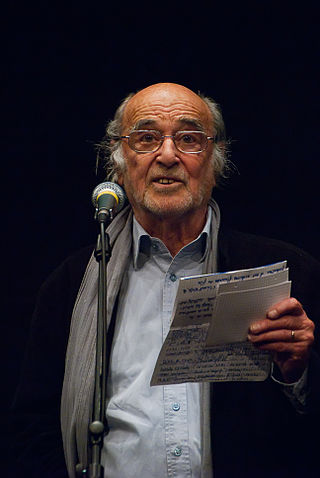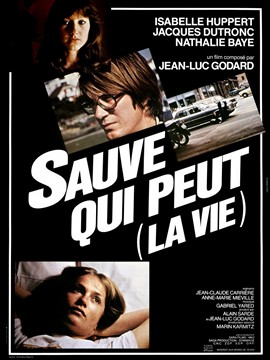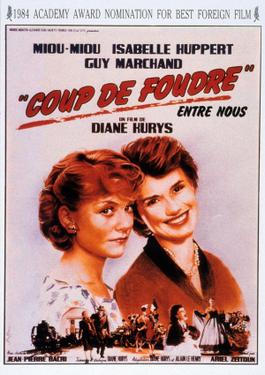
Alain Tanner was a Swiss film director.

Claude Goretta was a Swiss television producer and film director.

Pierre Lhomme was a French cinematographer and filmmaker.

Every Man for Himself is a 1980 drama film directed, co-written and co-produced by Jean-Luc Godard that is set in and was filmed in Switzerland. It stars Jacques Dutronc, Isabelle Huppert, and Nathalie Baye, with a score by Gabriel Yared. Nathalie Baye won the César Award for Best Supporting Actress. It also was submitted as the Swiss entry for the Best Foreign Language Film at the 53rd Academy Awards, but was not accepted as a nominee.

Paulo Branco is a Portuguese film producer.

Entre Nous is a 1983 French biographical drama film directed by Diane Kurys, who shares the writing credits with Olivier Cohen. Set in the France of the mid 20th century, the film stars Isabelle Huppert, Miou-Miou, Guy Marchand, Jean-Pierre Bacri, Christine Pascal, Denis Lavant and Dominique Lavanant. Coup de Foudre means "love at first sight".
Philippe Sarde is a French film composer. Considered among the most versatile and talented French film composers of his generation, Sarde has scored over two hundred films, film shorts, and television mini-series. He received an Academy Award nomination for Tess (1979), and twelve César Award nominations, winning for Barocco (1976). In 1993, Sarde received the Joseph Plateau Music Award.

Marie Dubois was a Parisian-born French actress.
The 9th César Awards ceremony, presented by the Académie des Arts et Techniques du Cinéma, honoured the best French films of 1983 and took place on 3 March 1984 at the Théâtre de l'Empire in Paris. The ceremony was chaired by Gene Kelly and hosted by Léon Zitrone. Le Bal and À nos amours tied for the award for Best Film.

Le bal is a 1983 Italian-Franco-Algerian film without dialogue directed by Ettore Scola that represents a fifty-year story of French society by way of a ballroom in France.

Ursula Meier is a French-Swiss film director and screenwriter.
Les petites fugues is a 1979 Swiss comedy film directed by Yves Yersin. It competed in the Un Certain Regard section at the 1979 Cannes Film Festival. The film was produced by Filmkollektiv Zurich. The film was selected as the Swiss entry for the Best Foreign Language Film at the 52nd Academy Awards, but was not accepted as a nominee.
Hécate is a 1982 French-Swiss drama film directed by Daniel Schmid. It is based on the 1954 novel Hecate and Her Dogs by Paul Morand. It was entered into the 33rd Berlin International Film Festival.
Incomplete Eclipse is a 1982 Czech drama film directed by Jaromil Jireš. It was entered into the 33rd Berlin International Film Festival. The film was also selected as the Czechoslovak entry for the Best Foreign Language Film at the 56th Academy Awards, but was not accepted as a nominee.

The Salamander is a 1971 Swiss drama film directed by Alain Tanner. The film was selected as the Swiss entry for the Best Foreign Language Film at the 45th Academy Awards, but was not accepted as a nominee.
The Middle of the World is a 1974 Swiss-French romance film directed by Alain Tanner. The film was selected as the Swiss entry for the Best Foreign Language Film at the 47th Academy Awards, but was not accepted as a nominee. It was screened at the 2011 International Filmfestival Mannheim-Heidelberg.

Guaguasi is a 1983 Dominican war comedy-drama film directed by Jorge Ulla. The film was selected as the Dominican entry for the Best Foreign Language Film at the 56th Academy Awards, but was not accepted as a nominee.
The Diary of Lady M is a 1993 Swiss drama film directed by Alain Tanner. The film was selected as the Swiss entry for the Best Foreign Language Film at the 66th Academy Awards, but was not accepted as a nominee.

Félicité is a 2017 Senegalese drama film set in the Democratic Republic of the Congo and directed by Alain Gomis. It was selected to compete for the Golden Bear in the main competition section of the 67th Berlin International Film Festival. At Berlin, the film won the Jury Grand Prix award. At the 2017 Africa Movie Academy Awards, it won six awards which is the highest for a film in the history of the award ceremony, including categories for best film, best actress, best supporting actor, best editing, best soundtrack and best film in an African language.












